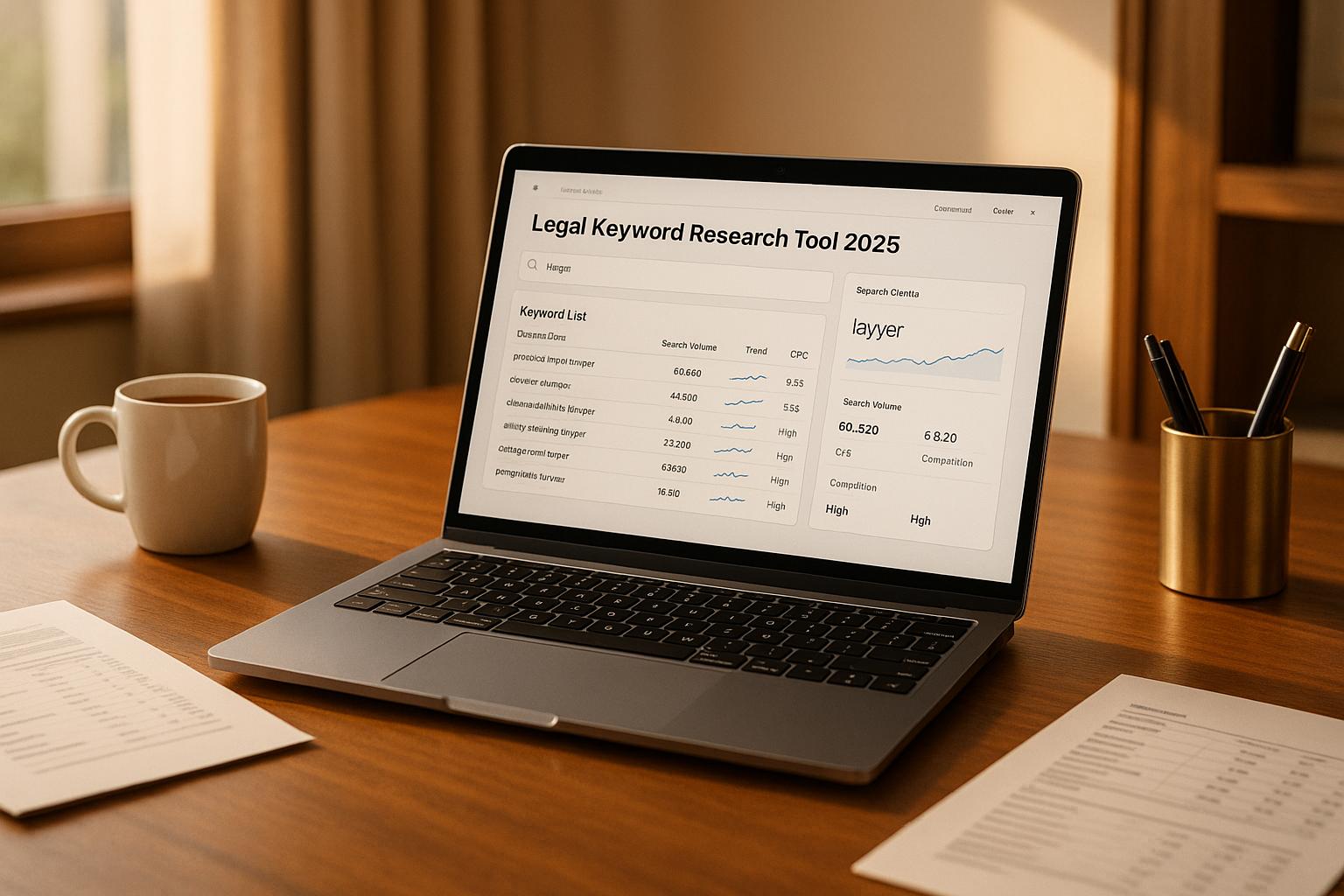Want your law firm to rank higher and attract clients online? Start with the right keywords. Legal keyword research is the foundation of effective digital marketing for law firms. It helps you connect with potential clients by targeting the search terms they’re already using. This guide breaks down everything you need to know about legal keyword research, from the basics to advanced techniques.
Key Takeaways:
- Why It Matters: Most legal clients start their search online. Targeting high-intent keywords like "personal injury lawyer in Chicago" ensures you reach people ready to hire.
- Challenges: Legal SEO must follow strict advertising and confidentiality rules, making compliance crucial.
- What to Look For: The best tools offer competitor analysis, local tracking, and privacy features tailored for law firms.
- Top Tools: Ahrefs, Semrush, Moz, and SearchX are excellent options, each with unique strengths for legal marketing.
- Budget Options: Free tools like Google Trends and Keyword Surfer can still provide helpful insights for smaller firms.
By using the right tools and strategies, your firm can improve visibility, generate leads, and stay ahead in the competitive legal market.
What to Look for in Legal Keyword Tools
Picking the right keyword research tool is a crucial step in shaping your law firm’s digital marketing strategy. Legal marketing comes with unique challenges, from understanding compliance requirements to focusing on local services. A good keyword tool should go beyond basic keyword discovery to meet these specific needs.
To help you make the best choice, let’s dive into three key features that can make a real difference in your ability to compete effectively while staying within legal advertising guidelines.
Competitor Keyword Analysis Features
Knowing which keywords your competitors are targeting can give you a serious edge in the legal market. The top keyword tools offer detailed insights into the terms driving traffic to competing law firms within your practice areas and locations.
One standout feature to look for is competitor gap analysis. This tool highlights keywords your competitors rank for but you don’t, pointing out areas where you could improve. For example, if a rival personal injury firm ranks for "slip and fall attorney near me" and you don’t, that’s a clear opportunity to expand your reach.
Some tools also allow you to analyze competitor content strategies, showing which pages on their websites perform well for specific legal terms. This insight can help you refine your own content structure and approach.
Another key feature is the ability to track competitor ranking changes over time. The legal market can shift quickly – competitors may launch new services or adjust their SEO strategies. A tool that alerts you to these changes lets you adapt and stay competitive.
For firms investing in paid advertising, paid search intelligence is invaluable. Many law firms spend heavily on Google Ads, so knowing which keywords your competitors are bidding on can guide your own strategy and help you avoid wasting money on less effective terms.
Local Keyword Tracking Capabilities
Since legal services are typically local, having a tool that tracks location-specific keywords is a must. The right tool should provide data tailored to your specific service areas, helping you connect with clients in your local market.
Neighborhood-level tracking offers a level of precision that goes beyond city-wide data. For firms in metropolitan areas, where search behavior can vary greatly between neighborhoods, this feature is particularly useful.
Tracking "near me" searches has become more important than ever with the rise of mobile searches. A good tool will show how your firm performs for location-modified queries like "divorce lawyer near me" or "DUI attorney near me" across different parts of your service area.
It’s also important to have access to local search volume data. National search volumes can be misleading – what’s popular nationwide may not be relevant to your area. Tools that provide city-specific or metro-area data help you focus on keywords that matter to your audience.
For firms with multiple offices, multi-location tracking is essential. This feature allows you to monitor keyword performance for each location, giving you a clear picture of how each office is doing in its respective market. It’s especially helpful for larger firms or those planning to expand into new areas.
Privacy and Compliance Features
In the legal field, privacy and compliance are non-negotiable. Keyword tools must meet strict standards, not just for data security but also for handling client information and supporting compliance efforts.
Start with data encryption and security. Look for tools that use enterprise-grade encryption to protect data during transmission and storage. Given the sensitive nature of legal work, your SEO tools should have security measures on par with your other professional software.
User access controls are another critical feature. These allow you to manage who can access specific data, ensuring that sensitive information stays protected. This is especially important when dealing with competitive intelligence or client-related keyword research.
Some tools also include audit trail capabilities, which document who accessed what data and when. These logs can be invaluable for maintaining compliance with advertising regulations and providing documentation to state bar associations.
When sharing keyword research, privacy-compliant reporting features can help. These tools let you create reports that focus on actionable insights without exposing sensitive data. Additionally, the ability to exclude sensitive terms from reports or dashboards ensures that confidential information doesn’t get shared accidentally, whether you’re working with external marketing partners or presenting data internally.
While it might be tempting to go for the cheapest option, remember that the right tool is one that meets your compliance needs while offering the competitive insights and local data essential for success in the legal market.
Best Legal Keyword Research Tools for 2025
When it comes to legal marketing, choosing the right keyword research tools can save time, cut costs, and help boost your search rankings. Below, we’ll explore some of the top tools available and how they cater to law firms’ specific needs.
Popular Keyword Tools Compared
Some of the most well-known keyword research tools provide detailed data and insights tailored for legal SEO. Here’s a closer look at a few top options:
Ahrefs is a great choice for analyzing which keywords drive traffic to competing law firms. It also offers detailed SERP analysis, making it easier to understand keyword difficulty and search volumes. Plans start at $99/month, with the Standard plan at $199/month being ideal for most users.
Semrush stands out for its local SEO features, which are especially useful for law firms targeting specific cities or regions. Its Position Tracking tool allows firms to monitor rankings in different locations. Pricing starts at $119.95/month for the Pro plan, while the Guru plan at $229.95/month includes historical data and expanded capabilities.
Moz Keyword Explorer offers user-friendly keyword difficulty scores and insights into local search behavior. Its Local Market Analytics feature is particularly helpful for understanding geographic-specific search trends. Plans start at $99/month, with the Medium plan at $179/month providing enhanced tracking options.
AccuRanker specializes in quick, accurate rank tracking and lets you break down data by location. It’s priced from $109/month for tracking up to 1,000 keywords, with enterprise-level options available for larger firms.
Here’s a quick comparison of these tools:
| Tool | Starting Price | Best Feature for Legal | Ideal Firm Size |
|---|---|---|---|
| Ahrefs | $99/month | Competitor backlink analysis | Medium to large firms |
| Semrush | $119.95/month | Local position tracking | All sizes |
| Moz | $99/month | User-friendly difficulty scores | Small to medium firms |
| AccuRanker | $109/month | Fast local rank tracking | Firms focused on rankings |
If you’re looking for a more tailored solution, SearchX might be worth exploring.
SearchX for Legal Keyword Research

Unlike standalone tools, SearchX offers a fully integrated SEO service designed specifically for law firms. Their approach combines keyword research with content strategies, technical improvements, and local SEO campaigns.
SearchX focuses on the unique challenges law firms face, such as compliance requirements and competitive local markets. Their process includes competitor gap analysis, local search optimization, and identifying question-based keywords that potential clients are searching for.
- Starter Plan ($3,000/month): Includes keyword tracking, reporting, content creation, and local SEO management.
- Growth Plan ($6,000/month): Adds in-depth competitor analysis and backlink research, with ongoing updates based on keyword performance.
- Enterprise Plan ($12,000/month): Designed for national campaigns, this plan includes AI visibility tracking to monitor how firms appear in AI-driven search results.
By integrating keyword insights directly into their SEO solutions, SearchX eliminates the need for firms to juggle multiple tools or learn complex software.
Free and Low-Cost Keyword Tools
For smaller firms or solo practitioners, free and budget-friendly tools can still provide valuable insights:
- Google Trends: This free tool shows search interest over time and across locations. It’s perfect for spotting seasonal trends, such as spikes in personal injury searches after winter storms or increased divorce-related searches in January.
- Keyword Surfer: A free Chrome extension that displays search volume data directly in Google results. It also suggests related keywords and content ideas, making it a convenient option for quick research.
- Google’s Keyword Planner: While designed for advertisers, it’s useful for organic keyword research too. It offers search volume ranges and keyword suggestions, though more detailed data requires running Google Ads campaigns.
- Answer The Public: This tool generates question-based keyword ideas, revealing what people are asking about legal topics. It’s great for creating content that addresses specific client concerns, like "What happens if I get a DUI?" or "How much does a divorce cost?"
Combining these tools can maximize their effectiveness. For example, you can use Google Trends to identify trending topics, Keyword Surfer to check search volumes, and Answer The Public to discover question-based content ideas. While these free tools lack the depth of paid platforms, they’re a solid starting point for smaller firms looking to make informed keyword decisions.
How to Set Up and Use Keyword Tools
If you’re ready to dive into legal keyword tools, knowing how to set them up and use them effectively is key. These tools can help law firms uncover local search opportunities and pinpoint the most relevant keywords for their practice areas. Let’s break down how to configure and make the most of these tools.
Setting Up Local SEO Keywords
For law firms, location targeting is a must since legal services are often tied to specific areas. Start by clearly defining your service regions in the keyword tools. For instance, a personal injury firm in Chicago should track keywords like "Chicago car accident lawyer" but also include nearby areas like Naperville and Schaumburg.
Most keyword tools allow you to track by city, state, or ZIP code. Be sure to set up tracking for the exact locations where your potential clients are searching. For example, a firm serving Cook County might focus on Chicago but should also include smaller cities like Evanston, Oak Park, and Cicero, where competition might be less intense.
Organize practice area keywords into separate folders or campaigns. For example, create distinct groups for personal injury, family law, criminal defense, and estate planning. This organization helps you monitor performance and identify opportunities within each area of your practice.
When setting up local keywords, don’t overlook the search intent behind them. Keywords like "divorce lawyer near me" suggest an immediate need, while "divorce laws in Illinois" indicate someone in the research phase. Tracking both types ensures you capture potential clients at every stage of their decision-making process.
How to Analyze and Prioritize Keywords
Legal SEO comes with its own set of challenges, so analyzing and prioritizing keywords requires a sharp focus. Use metrics like search volume, competition levels, and difficulty scores to identify keywords that align with your firm’s goals.
Keyword difficulty scores provide insight into how hard it might be to rank for a term. However, don’t let a high difficulty score discourage you. If competitors have weak content or poorly optimized websites, you could still rank well by creating high-quality, optimized content.
Commercial intent is often more important than search volume. Keywords like "hire DUI lawyer" or "file bankruptcy attorney" may have fewer searches but show clear intent to take action. These are the terms that can drive leads for your firm.
Geographic modifiers can help you find less competitive opportunities. While "personal injury lawyer Chicago" might be tough to rank for, more specific terms like "personal injury lawyer Lincoln Park" or "car accident attorney Downtown Chicago" may offer better chances to reach motivated local clients.
Pay attention to question-based keywords that reflect common client concerns. For example, searches like "how much does a divorce cost in Illinois" or "what happens if I refuse a breathalyzer test" indicate people looking for detailed answers – and possibly ready to hire an attorney.
Don’t forget about seasonal trends. Legal searches often fluctuate throughout the year. For instance, personal injury searches may increase during winter due to weather-related accidents, while divorce-related searches often spike in January and September. Use these patterns to guide your content planning and keyword focus.
Finally, track which keywords bring in the most qualified leads. Some terms might attract lots of visitors but result in few actual inquiries, while others may bring fewer visitors who are more likely to become clients. Focus your content strategy on the keywords that consistently deliver quality leads.
Using Keywords in Your Content Strategy
Once you’ve identified your target keywords, it’s time to integrate them into your content strategy.
Content mapping links your keywords to specific webpages. For example, your homepage might target a broad term like "Chicago personal injury lawyer", while individual service pages focus on terms like "truck accident attorney Chicago."
Blog posts are perfect for targeting longer-tail keywords and answering client questions. If your research shows searches like "statute of limitations personal injury Illinois", write a blog post addressing that topic. Informational posts like these often rank more easily and attract clients still in the research phase.
For landing pages, align titles, headers, and content with the commercial intent of your target keywords. This alignment ensures your pages meet both user expectations and search engine criteria.
Content clusters are another effective strategy for law firms with multiple practice areas. Create a main pillar page for a broad topic like "personal injury law" and link it to related pages on specific topics like "slip and fall accidents", "medical malpractice", and "wrongful death claims." This structure helps search engines see your expertise across related topics.
Don’t overlook local content opportunities. If your research uncovers searches like "car accidents on I-94" or "workplace injuries in downtown Chicago", create content that addresses these specific concerns. Hyper-local content can help you rank in less competitive searches.
Finally, keep your content up-to-date. Legal topics often change due to updates in laws and regulations. Use your keyword tools to monitor trending topics and refresh your content to reflect new developments. For example, if new legislation impacts personal injury claims in your state, update your relevant pages and create new content to capture related searches.
sbb-itb-880d5b6
Advanced Legal Keyword Research Techniques
Once you’ve got the basics of keyword research down, it’s time to step up your game. For law firms, advanced strategies can uncover hidden opportunities and help you stand out in a crowded market. These techniques not only improve your online visibility but also position your firm to attract clients at every stage of their decision-making process.
Finding New Legal Search Trends
Staying ahead means looking beyond the usual keywords. Emerging trends in the legal world – driven by new legislation, major court cases, or shifting public concerns – can reveal fresh opportunities that your competitors might miss.
Tools like Google Trends are perfect for spotting these rising topics. For example, as issues like data breaches or telehealth malpractice gain attention, search interest in these areas tends to spike. Keeping an eye on timely news updates can also help you identify moments when regulatory changes or landmark cases lead to a surge in related searches.
Social media platforms are another goldmine for spotting emerging legal queries. Reddit threads, Facebook groups, and Twitter conversations often highlight the questions and concerns potential clients are discussing right now. Additionally, industry publications and legal journals can act as early warning systems for topics that could soon drive search traffic.
And don’t forget to check out what your competitors are doing – or not doing. If other firms haven’t yet covered a trending legal issue, you have the chance to be the first to publish in-depth, optimized content, establishing your firm as a trusted authority.
Targeting Question-Based Keywords
The rise of voice search has made question-based keywords more important than ever. Queries like "What should I do after a car accident in Texas?" or "How much does it cost to file for divorce in California?" mirror how people naturally speak, and they often lead to featured snippet opportunities.
Featured snippets – those coveted "position zero" results at the top of search pages – are prime real estate. By creating content that directly answers common legal questions, your firm can increase click-through rates while building credibility as an authoritative source.
Long-tail question keywords are especially valuable. While a general term like "personal injury lawyer" might be tough to rank for, a more specific query like "What happens if the other driver doesn’t have insurance in Florida?" targets users with immediate needs, making them more likely to seek legal help.
FAQ pages are another powerful way to capture these queries. By creating detailed, well-organized FAQ sections that address multiple related questions, you can optimize each answer for specific keywords, boosting your visibility across a range of searches.
Local variations of question-based keywords add another layer of precision. For example, queries like "How long does probate take in Cook County?" or "What are the divorce laws in Harris County, Texas?" combine geographic targeting with natural language to attract highly relevant audiences.
Lastly, process-oriented questions – such as "How to file a workers’ compensation claim in Ohio" or "What documents do I need for bankruptcy in New York?" – are a goldmine. These users are actively seeking guidance, making them prime candidates for your services.
Using SearchX for Scalable Legal SEO
SearchX takes advanced keyword research to the next level by combining it with technical SEO expertise. Their keyword research service is designed to uncover high-value legal keywords that bring in qualified leads, not just traffic.
One of the standout features of SearchX is its ability to scale. As your firm expands its services or enters new markets, their systematic approach to keyword management ensures that your strategy grows with you – without becoming overwhelming. Their technical SEO services address critical factors like site speed and mobile optimization, ensuring your keywords perform at their best.
SearchX goes beyond rankings to focus on what really matters: generating leads and new clients. By integrating advanced keyword research with local optimization and ROI tracking, they help law firms refine their strategies for measurable, long-term results. Their SEO solutions also include competitive analysis and local market insights, striking the perfect balance between aggressive marketing and professional standards.
With SearchX, your firm can build a scalable, results-driven SEO strategy that keeps you ahead of the competition.
Key Takeaways for Legal Keyword Research in 2025
Legal keyword research is no longer a "set it and forget it" task. It’s a dynamic process that demands constant attention to stay ahead of evolving legal trends, search engine updates, and client behavior shifts. Here’s how to stay on top of your game:
Start with location-specific, compliant keywords. Your foundation should be built on keywords tailored to your practice areas and geographic location, while staying within industry regulations. A solid, locally-focused strategy ensures your efforts are both effective and ethical.
Choose tools that drive lead generation. Look for keyword research tools equipped with features like competitor analysis, local search tracking, and privacy compliance. These tools should directly contribute to attracting high-quality leads and help you measure meaningful outcomes. Once the basics are in place, explore advanced strategies to gain a competitive edge.
Adopt advanced tactics early. Focus on question-based keywords, trending legal topics, and voice search optimization. These strategies not only help you rank for featured snippets but also position your firm as a go-to resource for common legal inquiries. Crafting detailed, conversational content addressing these queries can make a big difference.
Leverage professional SEO support. Consider using services like SearchX to scale your keyword strategy efficiently. Automated systems can handle strategic adjustments, freeing up your time while ensuring your firm continues to grow into new markets or practice areas.
Monitor keyword performance monthly. The legal landscape can change overnight due to regulatory updates or major court rulings. A monthly review of your keyword performance helps you stay ahead of competitors and adapt to new trends, ensuring your efforts consistently deliver results.
Focus on conversions, not just rankings. High rankings mean little if they don’t generate consultations or new clients. Identify which keywords lead to actual conversions, and prioritize those in your strategy. Align your keyword efforts with broader business goals to avoid getting stuck chasing vanity metrics.
Firms that treat keyword research as a core component of their marketing strategy will lead the pack in 2025. By implementing these practices now, you’ll be well-positioned to attract more qualified leads while others are still catching up.
FAQs
How can law firms ensure their keyword research tools align with legal advertising and confidentiality standards?
Law firms can safeguard their advertising efforts and uphold confidentiality by selecting keyword research tools that emphasize data security. Look for platforms equipped with encryption and strong privacy measures to protect sensitive information. To further ensure confidentiality, avoid inputting any client or case-specific details into these tools.
It’s also important to confirm that these tools align with ethical standards for legal marketing. This includes steering clear of any misleading or overstated claims in advertisements. To stay on the right side of compliance, firms should regularly check the tool’s certifications and refine their internal practices to meet both legal and ethical requirements.
How do question-based keywords benefit legal SEO and help engage potential clients?
Using question-based keywords in legal SEO is a smart way for law firms to connect with potential clients by addressing their specific needs and concerns. These keywords are closely tied to what users are actively searching for, allowing firms to create content that directly answers common legal questions. This strategy not only helps improve search engine rankings but also attracts visitors who are more likely to need legal services.
By offering clear, straightforward answers through well-targeted content, law firms can establish trust and credibility with their audience. This builds stronger connections with potential clients and increases the chances of turning website visitors into actual clients, ultimately boosting both engagement and business growth.
How can advanced keyword research methods like competitor gap analysis and local keyword tracking improve a law firm’s online presence?
Advanced keyword research techniques, like competitor gap analysis, give law firms the chance to identify keywords their competitors rank for but they don’t. By targeting these overlooked opportunities, firms can create tailored, optimized content that boosts search engine rankings and draws in more potential clients.
Another powerful approach is local keyword tracking. This method zeroes in on location-specific search terms, helping law firms enhance their visibility in local search results. It’s particularly useful for appearing in features like Google’s Local Pack, which can significantly increase local traffic and client inquiries.
When combined, these strategies help law firms fine-tune their digital marketing efforts, attract high-value local clients, and stand out in both organic and local search rankings.




